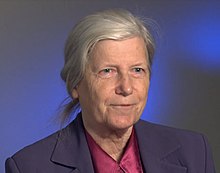Ingrid Munro, born Ingrid Mårtensson[1] 25 March 1941 in Norrköping, Sweden,[2] is a Swedish architect who founded and manages Jamii Bora, a microfinance organization based in Nairobi, Kenya.[3]

Life
editMunro trained as an architect and graduated at the Royal Institute of Technology in Stockholm in 1964.[4] From 1979 to 1984 she headed the Swedish council of building research, a government agency.[5] The United Nations proclaimed 1987 to be the "International year of shelter for the homeless" and Munro was appointed to convince governments to enact housing reforms. After her UN job a number of African governments offered her to lead the intergovernmental organisation African Housing Foundation, which she led from 1988 till 1999. She then began her career as an advocate for the poor in Kenya, pressing for their right to housing.[6]
Her father was a missionary and medical doctor. She herself is a Christian, and has mustered the support of churches in Sweden, although Jamii Bora equally serves the Christians and Muslims living in Kenya.
In 1999, upon Munro's retirement, she founded Jamii Bora along with 50 women beggars, loaning them twice as much as they agreed to save. Munro said she came to know the women after she and her husband, a Canadian, adopted first one boy who had lived on the street, then his two brothers, beginning in 1988. The New Yorker quotes her as saying, "It was a small seven-year-old boy who more or less adopted us....And then we later found his two brothers and adopted them. With a situation like that, like in all great love stories, in literature and in real life, you are a helpless victim, you know?"
In 2012 Ingrid Munro was featured in the documentary Half the Sky: Turning Oppression into Opportunity for Women Worldwide premiering on PBS October 1 and 2. The series introduces women and girls living under very difficult circumstances and bravely fighting to challenge them. The Half the Sky PBS TV series is produced by Show of Force along with Fugitive Films.
References
edit- ^ Liljas, Per (26 November 2007). "Bort från slummen med mikrokrediter" [Out of the slum with micro credits]. Svenska Dagbladet (in Swedish). Stockholm. Retrieved 27 September 2017.
- ^ Ingrid Jussil-Årlin at Svensk Filmdatabas
- ^ Billner, Amanda (2 April 2009). ""En mamma kan inte gå i pension"" [A mother can't retire]. Svenska Dagbladet (in Swedish). Stockholm. Retrieved 27 September 2017.
- ^ Graduation thesis from 1964 "Att bo i kollektivhus" [Living in a collective house] at Stockholm City archive
- ^ Sandström, Ulf (1994). Mellan Politik och Forskning (Staten och byggforskningen 1960-1992) [Between politics and research (The state and building research 1960-1992)] (in Swedish). Stockholm: Statens råd för byggnadsforskning.
- ^ Arrebäck, Miriam (2 January 2009). "Hon är årets förebild 2008" [She's the role model of the year 2008]. Dagen (in Swedish). Stockholm. Retrieved 27 September 2017.